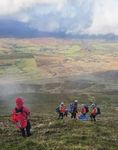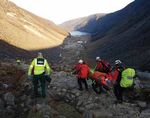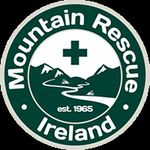MOUNTAIN RESCUE TEAM PLANS CENTRE AROUND NEW TRAINING BASE
←
→
Page content transcription
If your browser does not render page correctly, please read the page content below
MOUNTAIN RESCUE
MOUNTAIN RESCUE
TEAM PLANS CENTRE
AROUND NEW
TRAINING BASE
Dublin and Wicklow Mountain Rescue Team (DWMRT)
has big plans in place to future proof the service it
provides over the next few decades. The team recently
submitted a planning application to Wicklow County
Council for a proposed new 6,000 square foot two-
storey mountain rescue centre and training facility.
Report by Deirdre O’Flynn.
T
he suggested site plan of the
proposed development includes
training and breakout rooms,
operational facilities, storage for
equipment and drying and maintenance,
including a garage to house emergency
vehicles, according to Mark Flynn,
DWMRT’s Deputy Team Leader and a
member of the development committee.
“We purchased a site from Coillte at
Sraghmore in Roundwood and the plan is
to build early in 2021 and be ready in early
2022. We learned from bases in the UK to
build big and future proof the building so
that add-ons are not needed later,” Mark
told ‘Emergency Services Ireland’.
Once planning permission is
received, it is hoped to submit a LEADER
application to help fund the estimated
€800,000 cost of the facility, with
the remainder to be raised through
fundraising.
DWMRT is part-funded by the Irish
Government, but the team’s operational
costs far exceed the government funding
it receives. The rest of its operational
costs are met by donations, grants and
Mayo Mountain Rescue team members descend the North fundraising events.
Reek of Croagh Patrick with a casualty on a stretcher – DWMRT is manned by 60 volunteers
similar to DWMRT, Mayo Mountain Rescue Team is one of 11 and responds to emergencies in upland
teams represented by the Mountain Rescue Ireland. (Photo areas of Dublin, Wicklow, and Louth. The
courtesy of Mayo Mountain Rescue Team) team has been based in Roundwood, Co
Wicklow since its foundation in 1984. Two
58 EMERGENCY SERVICES IRELANDMOUNTAIN RESCUE
DWMRT is manned by 60 volunteers CLOSE INTERAGENCY
and responds to emergencies in upland COLLABORATION
areas of Dublin, Wicklow, and Louth. The team also works closely with
(Photo courtesy of National Lottery) the National Ambulance Service, the
Irish Coast Guard, the Irish Defence
Forces, Dublin Fire Brigade, Wicklow
Fire Service, Civil Defence, and other
voluntary emergency services.
In Roundwood, the team currently
operates out of a two-storey building
in the village and still has access to
a room next to the Garda Station.
“In order to help us provide the best
service we can, we hope to provide a
permanent base for the team,” John
told ‘Emergency Services Ireland’.
“This will allow for better training of
the team, better management of
mountain rescues, and indoor housing
of two vehicles.”
It will also allow for better
operational management of incidents.
“Most incidents are controlled from the
forest car park or the side of the road
near the incident. For longer-duration
incidents, say two or three days, we
need to move inside to properly
manage the incident. An operation
area in the new facility would allow
us to do that. “Indoor and outdoor
training facilities are also important to
upskill the team.”
While the main role of mountain
mountain rescue emergency vehicles emergencies on Cooley Mountain rescue teams still involves helping
are parked at Cheeverstown House on the Cooley Peninsula. “We have a people who are lost or injured in
in Templeogue, in South Dublin, to great relationship with the Coast Guard the hills, it also involves searching
facilitate quicker access to the Dublin unit in Greenore and have teamed up for missing persons, severe weather
mountains and West Wicklow. with them on call-outs,” noted John response, and body recovery from
In Louth, the team covers Kavanagh, PRO of DWMRT. remote locations. To perform these
We have a great relationship with the Coast Guard unit in
Greenore and have teamed up with them on call-outs” –John
Kavanagh, PRO of DWMRT. (Photo courtesy of National Lottery)
EMERGENCY SERVICES IRELAND 59MOUNTAIN RESCUE
ABOUT MOUNTAIN RESCUE IRELAND
Any request for emergency assistance in the upland and
mountainous areas on the island of Ireland is met by a
volunteer response from one of the 11 mountain rescue
teams that comprise Mountain Rescue Ireland (MRI).
MRI represents Donegal Mountain Rescue Team,
Dublin & Wicklow Mountain Rescue Team, Galway
Mountain Rescue Team, Glen of Imaal Mountain Rescue
Team, Kerry Mountain Rescue Team, Mayo Mountain
Rescue Team, Mourne Mountain Rescue Team, North West
Mountain Rescue Team, Search and Rescue Dog Association of Ireland, Sligo/
Leitrim Mountain Rescue Team, and the South Eastern Mountain Rescue
Association.
Whilst the number of call-outs nationally fell during the first and
second quarters of 2020 due to the Covid-19 lockdown (61 and 57
respectively), increases were noted for the rest of the year. Whilst the figures
for Q3 were not available at the time of print, “we know from the individual
teams of increased call outs and we can correlate those with the lifting of
restrictions on movement”, said Ruth Cunniffe, PRO of MRI.
What has also increased is the challenge of fundraising. Mountain rescue
is a service maintained entirely through volunteer efforts, and each volunteer
absorbs the cost of their own contribution in terms of time, sustenance, and
other costs such as transportation.
Rescue teams also have to fundraise in a bid to maintain the service they
provide. “Each team has an annual calendar of fundraising events, but none of
those are happening this year, so fundraising is down hugely,” she noted.
duties safely, team members are trained
in areas such as low-visibility navigation,
search skills, search management,
communications, pre-hospital emergency
medicine, helicopter operations, crag and
rope rescue, and swift-water rescue.
SKILLS AND QUALIFICATIONS
DWMRT is recognised by the Pre-Hospital
Emergency Care Council (PHECC) and
its members have first aid responder
qualifications. “Most team members
are emergency first responders, while
a number are emergency medical
technicians, or doctors.”
DWMRT recruits new team members
every year to 18 months. New-member
training usually takes six to nine months
and covers all of the basic skills required
of a mountain rescue team member.
These include stretcher packaging,
basic crag skills, search skills, poor-
visibility navigation, communications,
and helicopter safety. Each aspiring
team member must pass a number of
assessments before being accepted as
rescue team members.
The need for a permanent base for the
team – and welfare facilities for rescued
people – is evidenced by the increase in
call-outs over the last number of years.
Whilst there was a fall-off in call-outs
during the lockdown, the team had
already recorded 81 call-outs by early
DWMRT purchased the site from Coillte at Sraghmore in Roundwood and the
September. plan is to build early in 2021 and be ready in early 2022. “
60 EMERGENCY SERVICES IRELANDMOUNTAIN RESCUE
MOST COMMON INCIDENTS
“There were 25 call-outs in August alone. As Covid-19
eased, we became busier as people were coming out to
the hills more often. We would average about 100 calls a
year – 113 in one year is our record - and we’ve had four
simultaneous incidents in different corners of Wicklow.
That can be difficult to manage which is why a dedicated
facility is so important,” according to DWMRT’s PRO.
The most common incidents remain lower leg injuries,
including broken ankles, sprains, and lacerations. Others
include people getting lost due to loss of mobile phone
coverage while navigating the hills, or getting caught
when clouds or mists roll in. The team is also called on for
missing person searches and body recovery.
In a significant development, DWMRT is the first
mountain rescue team in Ireland and the UK to secure a
clothing partnership with Norwegian gear manufacturer
Helly Hansen.
“We have secured a five-year sponsorship deal and will
help Helly Hansen to develop clothing for mountain rescue
teams to be used throughout Europe,” noted DWMRT’s
Mark Flynn, who was instrumental in brokering the deal.
“Helly Hansen are keen to work with professionals on
their workwear and to use tried and tested gear in the all-
weather environment that we work in. They will provide us
with some key pieces of work kit and we are delighted with
that.”
For further information:
(Photo courtesy of Mountain Rescue Ireland) Dublin Wicklow Mountain Rescue Team: www.dwmrt.ie
Mountain Rescue Ireland: www.mountainrescue.ie
AMBULANCE SERVICE TAKES SARCALL
RESPONSE SYSTEM ON BOARD
A single platform that allows agencies to call out
mountain rescue teams is being used to great effect
by An Garda Síochána to task specific mountain
rescue teams of an incident in their area. Significantly
Sarcall is now being taken on board by the National
Ambulance Service, thereby allowing that service to
also task mountain rescue teams.
First developed in the UK, Sarcall is a software
package that enables mountain rescue teams to locate
incidents, record incident data, and capture debriefing
data. Developed by mountain rescue personnel, Sarcall
has now been adopted by teams in Ireland.
In Ireland, Donal McNamara and Pat Holland are
Sarcall’s Administrator and Development Officer for
(Photo courtesy of DWMRT)
Mountain Rescue Ireland (MRI) respectively. “Sarcall has
been live for over a year and was introduced as a call-
out mechanism, issuing texts to activate teams,” said agencies, Sarcall is proving popular with teams on the
Pat, who is a member of the South Eastern Mountain ground.
Rescue Association (SEMRA). “We would always notify An Garda Síochána as to
“The use of Sarcall is growing, with a live log being what we are doing, but Sarcall allows them to see what
established by the call-out officer, making it an incident is going on,” noted DWMRT’s John Kavanagh. “In our
command system. And, we’re seeing interactions case, we operate as a virtual team on Sarcall with the
between An Garda Síochána and the National Glen of Imaal Mountain Rescue Team. So, when the two
Ambulance Service, so the use is developing organically. teams are tasked, the notification comes in via Sarcall.
“The system increases situation awareness – for “Then, team members respond as to who is
instance, if I’m driving to an incident, I can stop, read available, so that the team leader can assess the
Sarcall, and then I’m fully briefed when I get there. So, available manpower for the incident. The call-out officer
Sarcall reduces the time spent briefing individuals.” takes it from there, and the deputy team leader agrees
A robust logged system for calling out teams, a response to the incident using the information from
maintaining incident logs, and informing all involved Sarcall.”
EMERGENCY SERVICES IRELAND 61You can also read


























































